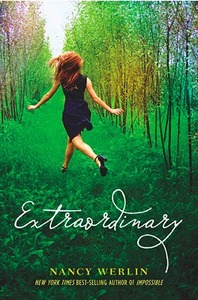You need to sign in or sign up before continuing.
Take a photo of a barcode or cover
I read Werlin's novel Impossible several years ago and really enjoyed it, so I found this at a local used bookstore and couldn't resist. I needed something light and enjoyable - I feel like I've been reading a lot of heavy fiction lately. I like the way Werlin subtly weaves Faerie into these novels - they're not overt stories of Faerie and the story is done well. I didn't enjoy Extraordinary quite as much as Impossible - I think the structure of the novel bothered me somewhat. The chapters were broken up by conversations with the Faerie Queen, so you knew almost everything that was going on before the protagonist (Phoebe), which left little mystery and just made me frustrated when Phoebe was slow to catch on. There was also a large element of the gorgeous mysterious man completely brainwashing Phoebe (using his faerie glamour) that made me really uncomfortable and I was ultimately dissatisfied with the way that situation ended (I don't want to give away spoilers, but I wish Phoebe herself had had more agency in that situation).
*3.5 stars.
I thought that the plot was very well done, and the writing was excellent. The reason I'm not rating it higher than 3.5 is that I didn't especially like most of the characters. I know that's the intention of the author- the reader isn't supposed to like Mallory or Ryland- but it caused me to enjoy the book a lot less than I might have. Also, Phoebe seemed a little bland. The only traits that I could really identify in her were her anxiety and insecurity, as well as her pride concerning her heritage. I think if she had been fleshed out a bit more, I might have liked her more.
The majority of the book made me sick to my stomach, but I really liked the last quarter or so, where we really get to see the characters develop. I wish the character Benjamin could have had a larger role in the story. All in all, I enjoyed it, but not that much.
I thought that the plot was very well done, and the writing was excellent. The reason I'm not rating it higher than 3.5 is that I didn't especially like most of the characters. I know that's the intention of the author- the reader isn't supposed to like Mallory or Ryland- but it caused me to enjoy the book a lot less than I might have. Also, Phoebe seemed a little bland. The only traits that I could really identify in her were her anxiety and insecurity, as well as her pride concerning her heritage. I think if she had been fleshed out a bit more, I might have liked her more.
The majority of the book made me sick to my stomach, but I really liked the last quarter or so, where we really get to see the characters develop. I wish the character Benjamin could have had a larger role in the story. All in all, I enjoyed it, but not that much.
Four years ago Phoebe Rothschild knew she wanted Mallory Tolliver as a friend–as her best friend. She was not sure why but she knew that Mallory with her tawdry, unsuitable clothes and her strange behavior would be a good friend to have, much better certainly than the friends Phoebe had previously found.
And Phoebe was right. For those four years at least.
Mallory always knew she needed to befriend the Rothschild girl. She knew what was required and expected of her by the Faerie Queen and the rest of her people. But still, for just a little while, she wanted what Phoebe had; she wanted the chance to be a normal teenaged girl.
Which is exactly what Mallory got. For those four years at least.
But time is running out: A debt must be repaid by an ordinary girl, a dangerously magnetic man will draw Phoebe to a perilous choice, and a friendship will be tested in Extraordinary (2010) by Nancy Werlin.
Extraordinary is quite impressive. Well-written, clever, and compelling this story will leave readers enchanted. Werlin’s looping prose and melodic tone are masterful and work wonderfully with this fairy tale styled story. The book combines a delightful plot with very arresting characters and, as the title might suggest, also offers an interesting commentary on what it really means to be ordinary (or extraordinary).
Phoebe is a really unique narrator. She has asthma and comes from a prominent Jewish family–both of which are important elements of the story. But the great thing is neither of those things are the main event in the story, they are just facets of Phoebe’s complex character. Phoebe also spends a lot of the story being beguiled or out and out tricked by other characters. The interesting thing about Werlin’s writing is that she conveys that while simultaneously evoking Phoebe’s own (often confusing) emotions.
This story is also unique in that, at its center, readers will find two friends instead of the romantic threads that are becoming so prevalent in fantasy books (and of course also spawned their own genre called “paranormal romance”).
There is definitely nothing ordinary about this book. In short, Extraordinary is a remarkable story about the transformative power of friendship.
Possible Pairings: White Cat by Holly Black, The War for the Oaks by Emma Bull, The Blue Girl by Charles De Lint, Revolution by Jennifer Donnelly, Guardian of the Dead by Karen Healey, Fire and Hemlock by Diana Wynne Jones, The Demon Trapper’s Daughter by Jana Oliver, The Last of the High Kings by Kate Thompson, The Replacement by Brenna Yovanoff
You can find this review and more on my blog Miss Print
And Phoebe was right. For those four years at least.
Mallory always knew she needed to befriend the Rothschild girl. She knew what was required and expected of her by the Faerie Queen and the rest of her people. But still, for just a little while, she wanted what Phoebe had; she wanted the chance to be a normal teenaged girl.
Which is exactly what Mallory got. For those four years at least.
But time is running out: A debt must be repaid by an ordinary girl, a dangerously magnetic man will draw Phoebe to a perilous choice, and a friendship will be tested in Extraordinary (2010) by Nancy Werlin.
Extraordinary is quite impressive. Well-written, clever, and compelling this story will leave readers enchanted. Werlin’s looping prose and melodic tone are masterful and work wonderfully with this fairy tale styled story. The book combines a delightful plot with very arresting characters and, as the title might suggest, also offers an interesting commentary on what it really means to be ordinary (or extraordinary).
Phoebe is a really unique narrator. She has asthma and comes from a prominent Jewish family–both of which are important elements of the story. But the great thing is neither of those things are the main event in the story, they are just facets of Phoebe’s complex character. Phoebe also spends a lot of the story being beguiled or out and out tricked by other characters. The interesting thing about Werlin’s writing is that she conveys that while simultaneously evoking Phoebe’s own (often confusing) emotions.
This story is also unique in that, at its center, readers will find two friends instead of the romantic threads that are becoming so prevalent in fantasy books (and of course also spawned their own genre called “paranormal romance”).
There is definitely nothing ordinary about this book. In short, Extraordinary is a remarkable story about the transformative power of friendship.
Possible Pairings: White Cat by Holly Black, The War for the Oaks by Emma Bull, The Blue Girl by Charles De Lint, Revolution by Jennifer Donnelly, Guardian of the Dead by Karen Healey, Fire and Hemlock by Diana Wynne Jones, The Demon Trapper’s Daughter by Jana Oliver, The Last of the High Kings by Kate Thompson, The Replacement by Brenna Yovanoff
You can find this review and more on my blog Miss Print
It wasn't a bad book at all, great story line just a little slow for me. I wish we could give half stars, I would give this book a 2.5
It started out a little slow but once I got into the story I couldn't put it down. Especially the last 150 pages or so.
**Slight generalized spoilers- I don't reveal the ending but I discuss some plot points**
Extraordinary is a unique young adult novel. Werlin weaves a fantasy story that addresses contemporary issues head on. Phoebe and Mallory are best friends, and but for there being faeries involved, their friendship reads like a deeply real portrait of teenage friendship through its ups and downs. When Phoebe turns 18, she becomes involved in what is clearly an abusive relationship. The plot tells us that there is more to it than that, and Mallory and her brother (Phoebe's sort-of boyfriend) are operating from ulterior motives, but that doesn't lessen the horror of reading the verbal and emotional abuse inflicted on poor, un-self-confident Phoebe. That was hard for me as a reader to get through, because I kept wanting Phoebe to get away from that crushing relationship.
Ultimately, however, readers watch Phoebe grow into herself and grow in self confidence. I was fascinated by the focus on the powerful Rothschild family, and the way Werlin tied that remarkable Jewish dynasty to the faerie curse and the personal development of Phoebe Rothschild, even relating the Holocaust to events in the faerie world.
Overall, a good read, though not my favorite, and not as good as Werlin's novel Impossible.
Extraordinary is a unique young adult novel. Werlin weaves a fantasy story that addresses contemporary issues head on. Phoebe and Mallory are best friends, and but for there being faeries involved, their friendship reads like a deeply real portrait of teenage friendship through its ups and downs. When Phoebe turns 18, she becomes involved in what is clearly an abusive relationship. The plot tells us that there is more to it than that, and Mallory and her brother (Phoebe's sort-of boyfriend) are operating from ulterior motives, but that doesn't lessen the horror of reading the verbal and emotional abuse inflicted on poor, un-self-confident Phoebe. That was hard for me as a reader to get through, because I kept wanting Phoebe to get away from that crushing relationship.
Ultimately, however, readers watch Phoebe grow into herself and grow in self confidence. I was fascinated by the focus on the powerful Rothschild family, and the way Werlin tied that remarkable Jewish dynasty to the faerie curse and the personal development of Phoebe Rothschild, even relating the Holocaust to events in the faerie world.
Overall, a good read, though not my favorite, and not as good as Werlin's novel Impossible.
Definitely not an "ordinary" book, but not quite "extra-ordinary" either - this falls somewhere solidly in the middle. What starts out being a tale about Something's Wrong in Faerie evolves into some interesting questions about self-image and family.
Phoebe's feelings of self-worth are caught up in her being a Rothschild (it's never explained why she has her mother's name, not her father's, particularly when her parents are married); she's become friends with some of the Mean Girls in school but is starting to question this after a summer in Nantucket. The current object of the Mean Girls' "affection" is Mallory, a new girl who has more than questionable fashion taste; Phoebe, thinking for herself for a change, chooses to leave her former friends in favor of taking care of Mallory (and ultimately Mallory's clearly unstable mother).
Intercut with this are a series of interviews with the Fairy Queen, in which it becomes clear that Mallory's "mom" is unstable because of something Mallory - who is not human but some agent of the Queen's, on some mission that involves forcing Phoebe to do something. Through these interviews we learn that this something will greatly affect Faerie, and is somehow tied into the patriarch of the Rothschild family.
Flashing forward a few years, we see Mallory failing in her mission yet being Phoebe's best friend. The Queen decides to send Ryland, Mallory's brother, to complete the mission. It's at this point that the questions of self-worth become interesting.
Essentially, Phoebe's self-confidence is being undermined both subtly and overtly by the siblings. Her confusion and shock is very real, and will resonate with any reader who has also wondered whether it is possible to live up to powerful, prominent parents. The passage where she says that her parent's unconditional, unearned love when she was born makes her special - no matter what happens later in life - is particularly moving. It's also great that she doesn't feel that she must be beyond ordinary, that ordinary is perfectly ok.
This is exactly what the Faerie Queen is waiting for, and the shift from this coming-to-grips with your intrinsic value and worth to a discussion/decision about genocide is a bit jarring. A lot is made about Phoebe's Jewish roots and her identification with the cultural aspects (deep religious feeling is not indicated). This book would have been equally effective had Phoebe not been a Rothschild and not Jewish but simply a girl who understands that she (and she alone) can save an entire race.
Of course, things don't end unhappily, and Phoebe and Mallory end on a good note; Mallory has learned to care for her "mother" and feels bad about her manipulation of Phoebe, while Phoebe forgives Mallory (at least, that's what it appears happens) and has the confidence to deal with a changed relationship with Benjamin, her Nantucket friend.
One wonderful thing about this book - it's not part of a series! YAY!! (that's not to say I don't want to read more from the author, but I'm so tired of stories being stretched out to accommodate this idea that what we readers really want are series and trilogies and not well-written one-offs).
ARC provided by publisher.
Phoebe's feelings of self-worth are caught up in her being a Rothschild (it's never explained why she has her mother's name, not her father's, particularly when her parents are married); she's become friends with some of the Mean Girls in school but is starting to question this after a summer in Nantucket. The current object of the Mean Girls' "affection" is Mallory, a new girl who has more than questionable fashion taste; Phoebe, thinking for herself for a change, chooses to leave her former friends in favor of taking care of Mallory (and ultimately Mallory's clearly unstable mother).
Intercut with this are a series of interviews with the Fairy Queen, in which it becomes clear that Mallory's "mom" is unstable because of something Mallory - who is not human but some agent of the Queen's, on some mission that involves forcing Phoebe to do something. Through these interviews we learn that this something will greatly affect Faerie, and is somehow tied into the patriarch of the Rothschild family.
Flashing forward a few years, we see Mallory failing in her mission yet being Phoebe's best friend. The Queen decides to send Ryland, Mallory's brother, to complete the mission. It's at this point that the questions of self-worth become interesting.
Essentially, Phoebe's self-confidence is being undermined both subtly and overtly by the siblings. Her confusion and shock is very real, and will resonate with any reader who has also wondered whether it is possible to live up to powerful, prominent parents. The passage where she says that her parent's unconditional, unearned love when she was born makes her special - no matter what happens later in life - is particularly moving. It's also great that she doesn't feel that she must be beyond ordinary, that ordinary is perfectly ok.
This is exactly what the Faerie Queen is waiting for, and the shift from this coming-to-grips with your intrinsic value and worth to a discussion/decision about genocide is a bit jarring. A lot is made about Phoebe's Jewish roots and her identification with the cultural aspects (deep religious feeling is not indicated). This book would have been equally effective had Phoebe not been a Rothschild and not Jewish but simply a girl who understands that she (and she alone) can save an entire race.
Of course, things don't end unhappily, and Phoebe and Mallory end on a good note; Mallory has learned to care for her "mother" and feels bad about her manipulation of Phoebe, while Phoebe forgives Mallory (at least, that's what it appears happens) and has the confidence to deal with a changed relationship with Benjamin, her Nantucket friend.
One wonderful thing about this book - it's not part of a series! YAY!! (that's not to say I don't want to read more from the author, but I'm so tired of stories being stretched out to accommodate this idea that what we readers really want are series and trilogies and not well-written one-offs).
ARC provided by publisher.
It was okay. A bit long for what it was trying to accomplish, though.
This is a great book! There are so many valuable lessons you can take from reading this. It is absolutely "extraordinary". hehe see what i did there? well anyway i can't wait to read more from this author!!!!!!!






